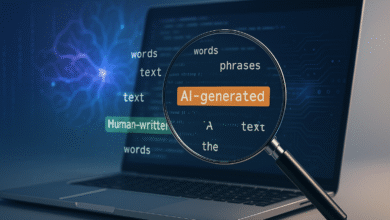
Ever feel like you’re spending more time fixing code than building cool stuff? You’re not alone. Between chasing bugs, writing boilerplate, and digging through documentation, coding can start to feel like a grind.
But what if you had an assistant—one that never sleeps, understands your code, and helps you move faster without cutting corners?
Welcome to the world of AI-powered coding assistants. From GitHub Copilot to Amazon CodeWhisperer and JetBrains AI Assistant, these tools are quietly changing the game for developers everywhere.
In this post, we’ll explore 10 powerful ways AI is helping devs save serious time, write cleaner code, and actually enjoy coding again.
1. Auto-Completion of Boilerplate Code
Repetitive coding tasks can drain time and energy, especially when writing boilerplate code that adds little creative or functional value. AI coding assistants remove that friction by automatically generating boilerplate structures—whether you’re setting up classes, writing HTTP endpoints, or configuring routes.
A study found that developers using GitHub Copilot completed tasks 55% faster than those coding without assistance. In one comparison, building a simple web server took 1 hour and 11 minutes with Copilot, versus 2 hours and 41 minutes without it.
- Time Saved: 1–2 hours per project
- Tools: GitHub Copilot, Amazon CodeWhisperer
2. Instant Code Documentation
Documentation is often one of the first tasks to be skipped under pressure, yet it plays a crucial role in code readability and team collaboration. AI assistants streamline this process by generating function-level comments, docstrings, and inline explanations automatically as you write.
According to McKinsey, teams using AI tools experienced a 45–50% reduction in time spent on documentation. Additionally, 81% of development teams expect AI to automate at least a quarter of these types of tasks in the near future.
- Time Saved: 2–4 hours per week
- Tools: JetBrains AI, Tabnine, Codeium
3. Real-Time Bug Detection and Fix Suggestions
Finding and fixing bugs can take up a significant portion of development time, particularly when issues go unnoticed until later stages. AI-powered tools help catch bugs in real time—surfacing errors as you write code and often offering intelligent suggestions for how to fix them.
In practice, Copilot-assisted code showed a 5% higher approval rate and a 2.94% improvement in reliability. Gartner also reports that AI debugging tools can reduce repetitive debugging effort by up to 30%.
- Time Saved: 3–5 hours per sprint
- Tools: CodeWhisperer, Amazon Q Developer, DeepCode
4. Fast Prototyping of New Features
Prototyping new features often involves experimenting with different approaches, which can slow down momentum. AI accelerates this phase by generating functional code snippets based on natural language prompts or partial input, allowing developers to quickly bring ideas to life.
Surveys show that 62% of developers experienced a productivity increase of over 25% while using AI tools for prototyping. Notably, 8% reported their productivity more than doubled.
- Time Saved: 5–10 hours per feature
- Tools: Copilot, Gemini Code Assist, Replit Ghostwriter
5. Language Translation Between Frameworks or Languages
Translating code between languages or frameworks is often tedious and error-prone. Whether you’re migrating a module from JavaScript to TypeScript or converting an entire system from Python to Go, AI coding tools can handle the translation accurately and efficiently.
Amazon Q and OpenAI-based models now support multilingual code generation and translation. According to internal data from Google, 30–35% of newly written code across some teams is now AI-generated, much of it involving language or framework transitions.
- Time Saved: 2–8 hours per module
- Tools: Amazon Q Developer, ChatGPT Code Interpreter, SWE-agent
Also Read: Top 10 Co-Development Software Tools for 2025: Features and Reviews
6. Writing Unit Tests Automatically
Creating comprehensive unit tests is essential but can be time-consuming. AI can generate test cases that match your code’s logic, often with broader coverage than what would be produced manually. This reduces both the initial time investment and the risk of human oversight.
JetBrains AI users have reported up to 8 hours saved per week when generating unit tests automatically. These AI-generated tests also achieved more than 70% statement coverage, outperforming many manually written test suites.
- Time Saved: 3–8 hours per testing cycle
- Tools: JetBrains AI Assistant, Diffblue, OpenAI Codex
7. Learning New APIs and Libraries on the Fly
Working with unfamiliar APIs or libraries usually means bouncing between documentation, Stack Overflow, and trial-and-error coding. AI coding assistants minimize this context switching by suggesting relevant methods, parameters, and code patterns in real time.
Developers using AI spend more time exploring and experimenting because research overhead is lower. In recent surveys, 44–46% of developers said they rely on AI tools to help them navigate unfamiliar tools, APIs, and SDKs.
- Time Saved: 1–3 hours per week
- Tools: Copilot, Tabnine, Cursor
8. Refactoring Suggestions for Cleaner Code
Refactoring is vital for maintaining long-term code quality, but it often gets postponed due to time constraints. AI assistants can analyze your code and suggest cleaner, more efficient structures—sometimes even automatically performing safe refactors.
McKinsey research indicates a 20–30% reduction in time spent on refactoring when using AI. Developers also report that AI assistants have successfully refactored over 70% of their legacy codebases, saving time and improving maintainability.
- Time Saved: 2–6 hours per week
- Tools: Codiga, IntelliJ AI Plugin, Zencoder RefactorBot
9. Generating SQL Queries from Natural Language
Translating a business question into a complex SQL query can be challenging, especially for those who aren’t SQL experts. AI coding tools now allow developers to input natural language queries—like “show me revenue by region for the last quarter”—and get accurate, ready-to-run SQL.
This helps reduce dependency on analysts and minimizes context switching. Tools like Amazon Q and ChatGPT are now used widely for these tasks in both dev and data teams.
- Time Saved: 2–4 hours per report
- Tools: ChatGPT, Hex, Amazon Q, MindsDB
10. Code Review Assistance
Code reviews are essential for maintaining quality, but they’re time-consuming. AI tools now assist reviewers by flagging errors, suggesting style corrections, and even identifying potential vulnerabilities or anti-patterns—all before the code is merged.
Teams using Copilot for review workflows report 50% faster merge times, as well as a 5% increase in approval rates and fewer bugs post-deployment.
- Time Saved: 2–5 hours per sprint
- Tools: GitHub Copilot, ReviewBot AI, Codacy AI
Final Thoughts: Are AI Coding Assistants Worth It?
The short answer is yes. Whether you’re working independently or within a large engineering team, AI-powered coding tools deliver measurable improvements in both speed and quality. Across the board, they:
-
Increase productivity by 25–50%
-
Reduce or eliminate repetitive manual tasks
-
Improve code consistency and quality
-
Free up time for developers to focus on creative, high-impact work
As AI tools continue to evolve, they are becoming indispensable allies in modern software development—making the development process faster, smoother, and more enjoyable.







